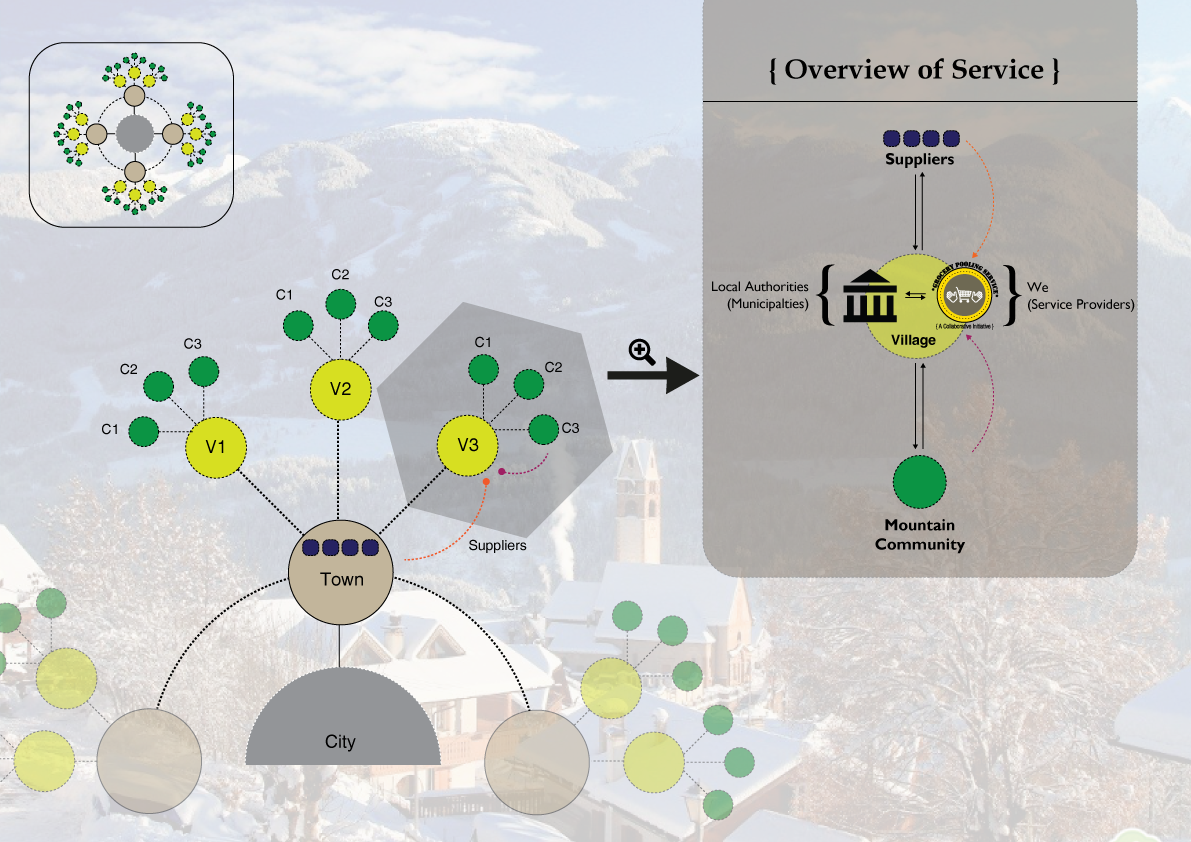Collaborative Service initiative that hints at streamlining grocery shopping for mountain dwellers in northern Italy
Social Innovation | Service Design | Business Design | December 2015
Project was developed in collaboration with Silvia Podesta`
How might we design collaborative solutions that offers an efficient, but cost-effective system
of grocery shopping which will contribute to the goal of a sustainable survival of Mountain communities in northern Lombardy region of Italy ?
Background
One of Italy’s largest regions, Lombardy lies in the north of the
country, sharing a border with Switzerland. The capital is Milan.
A sixth of Italy’s population lives in Lombardy and about a fifth of Italy’s GDP is produced in the region, making it the most populous and richest region in the country.
The climate of this region is continental, though with variations depending on altitude or the presence of inland waters.
Mountain Communities as established by Italian territory regulations are proving to be an essential concept in guaranteeing services also to small aggregates of dwellers, by virtue of convenient coalescence of functions and services provided by municipalities, but something more needs to be done for those tiny villages perched upon mountains and detached by main routes, facilities and networks.
Scope of the project
Over the last decade,these mountain communities have been suffering from depopulation and aging, mainly due to the inconveniences of isolation and the environmental surroundings.
Due to this they are facing rising concerns regarding to maintain proper life standards and carry out normal economical activities.
The option of a collaborative solution, which implies the active
participation of the recipients could possibly translate in a win-win solution, that benefits not just the mountain dwellers but also municipalities, by offering a simple, efficient, but cost-effective system for achieving the goal of a sustainable survival of mountain communities.
Research and insight finding : Understanding the people, setup, context
After understanding basic background, we carried out in-depth ethnographic research in the target communities that has highlighted forms of mutual collaboration among dwellers, to make up for the scarce availability of a structured network of home delivery services. Neighborhood relationships seem to work out better there than in the downstream villages: people sharing a very limited space tend to help each other by offering their own resources (car, time spent to do shopping for others). Surveys also have shown how aging trends into these communities are diminishing their autonomy and isolating their members . This way, carrying out basic daily activities may result more difficult and even riskier sometimes.
The Hybrid Approach
The Solution : Grocery Pooling_ A collaborative Initiative
The mission of Grocery Pooling is guaranteeing the survival of small mountain communities, providing them with a very simple way to provision groceries and supplies,to reduce the impact of isolation and infrastructure disruptions on the quality of life, besides encouraging participation and community empowerment.
What moves this project is our vision of a network of autonomous local communities, diverse in structure and specificities, whose presence and share could contribute to the well-being of the region, in terms of economical activities and touristic attractiveness.



Strategy and Implementation
This scheme leverages existing cultural and behavioral patterns already in place in many isolated mountain villages and it may be an affordable solution for municipalities to benefit communities. Its collaborative approach allows to reduce costs, to foster socialization and neighborhood bonds and to empower often low-income or retired people, by offering a remuneration for the service provided.
During this process we tried to understand market and possible competitors. With the help of tools like SWOT and competition analysis in the grocery delivery sector we tried to position this new proposition with its unique points.
Looking 'Outside In'
Looking 'Inside out'
Blue Ocean Strategy
Our service is here plotted together with potential competitor stores, which do offer grocery delivery in the selected region, with substitute, namely private cars, and with a start up whose business model could be highly competitive to ours, but which is not operating in our geographic area (Instacart).
To know more in detail, have a look at full report document. Here is a link : "Grocery Poooling_Full report"












